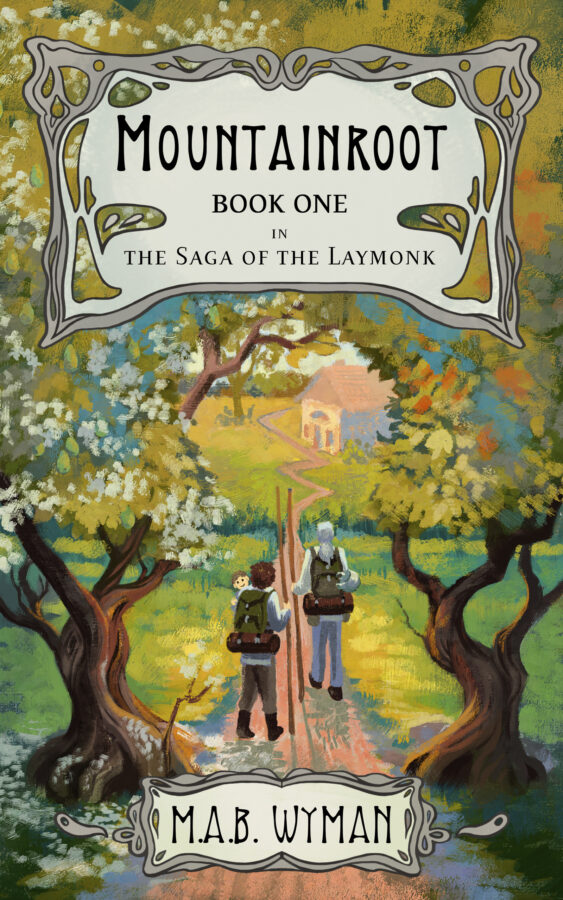Genre: Epic Fantasy
Reviewer: Scott
Get It On Amazon
About The Book
Rumors are swirling in the northlands about a curse in Westcliff. People are being driven mad by the touch of angry ghosts during the full moon, in a village already haunted by a brutal murder from decades ago.
Growing up as an orphan, Genshai always expected his life would be the same as the other warriors of the abbey: learning the ways of the Iron Style, and training his mind and body toward Illumination. But, at the start of his fifteenth year the boy is shocked when the abbot names him the new laymonk, and he is sent to learn the ways of the world from his predecessor, an old man named Taisan.
Soon, Genshai receives firsthand lessons in ways that he never imagined- from fighting for his life, to defending the innocent, and even striding between two worlds, into the ethereal Veil. And just as Genshai is beginning to learn how to keep the Still Mind in the presence of spirits, the laymonks are sent to Westcliff to break an old curse, and to confront an unfathomable evil.
By taking up the staff of the laymonk, will Genshai uncover the truth about himself? Or will the madness spread, causing his greatest fears to be revealed on the night the Lotus is in Bloom?
The Review
M.A.B. Wyman’s first book is a lush, sprawling epic fantasy that draws on works that came before it – including Game of Thrones and Lord of the Rings – but manages to find its own path, weaving a fascinating tale in the land of Kuei. The world has an Asian feel, with Arovia reminiscent of China and the Steppes of Thrail similar to Mongolia.
The prequel sets up a coming battle of grand proportions, as an escaped shapeshifting demon takes on human form and foments a war between two of the nations of Kuei. But what comes next is, for quite a while, a much gentler fantasy, as the story follows the Laymonk Taisan and his apprentice Genshai (also called Mountainroot) as they travel the Arovian countryside. Arovia is one of the major nations in Kuei, and the monks occupy the Red Tower on a mountainside over Auburntown, both built from the red rock of the local mountains.
The monks are skilled in the martial arts, and most of them were abandoned as children and taken in by the monastery. They are mostly celibate, but it’s a loose rule, and one that doesn’t apply to laymonks like Taisan.
Taisan is a wise traveler who seems to know everyone – very much like Gandalf in LOTR. While he’s not a wizard, he does possess powers that come from his mastery of self via his martial arts training, and he is teaching Genshai everything he knows. He is revealed, early on, to be gay, with a partner he sees periodically when he visits the Norr Province.
His travels with Genshai eventually lead to the cursed town of Westcliffe, and a mystery they must unravel if they are to free the town from its horrific monthly hauntings.
At the same time, across the continent, Bokhili and his twin Selem seek vengeance on the man who killed most of their family in the prologue. They’re part of a nomadic people who live on the steppe, and reminded me a bit of the Dothraki. In their culture, twins (khagasun) are an anathema – a diluting of one person’s essence into two – and so in most cases one twin is killed at birth. But in their case, a Shaman declared that both boys should be allowed to live and train as one man, and they’ve been together ever since.
Interestingly, the nomads have an origin myth about the sun and the moon that’s very homoerotic.
Wyman’s writing is beautiful and evocative. We can see, hear and practically taste everything on Genshai’s adventure, which is the heart of the tale. Kuei is a rich and varied world, and we’ve only gotten to explore a tiny corner of it in Mountainroot, apparently the first book in a planned series.
The characters are well-drawn and distinct, and Genshai especially has a very appealing naiveté about him as he learns the ways of the world and the human heart.
Wyman is a new writer, and it does show here in a few ways. There’s the frequent use of verbs of perception – he saw that it happened, she heard that it was taking place – that add unnecessary distance between the reader and some of the events. This story is told in third party omniscient, but it also often head hops in the middle of a scene, which can be disconcerting until you get used to it. And the story structure is a bit odd – after the demon character introduction in the prologue, we spend a long time with Taisan and Genshai, then flip to the twins, then back and forth a couple times. At the end, there are two brief codas, one with a couple in Auburntown, and the epilogue, which reveals a new (presumably good) character, who I’m guessing will figure prominently in book two.
Those grumblings aside, this is a fantastic book, well worth the read. I immersed myself in Wyman’s world and didn’t want to come out. A strong, unique epic fantasy tale that knows where it’s going and makes you root for its characters while sometimes scaring the bejeezus out of you. Highly recommended.
The Reviewer
Scott is the founder of Queer Sci Fi, and a fantasy and sci fi writer in his own right, with more than 30 published short stories, novellas and novels to his credit, including two trilogies.


